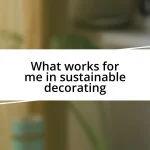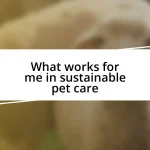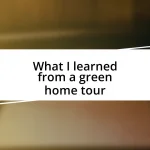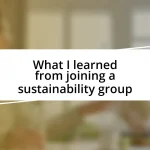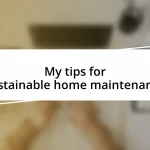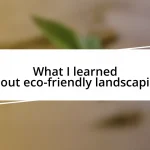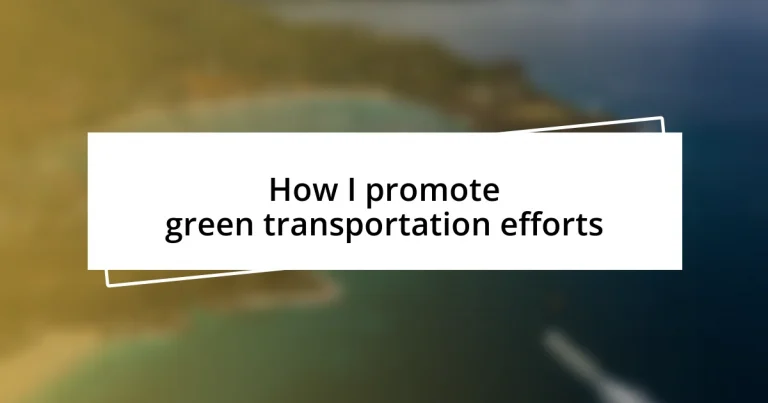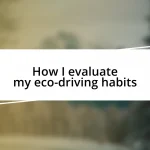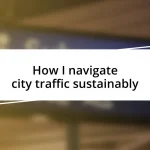Key takeaways:
- Green transportation encompasses diverse options beyond electric vehicles, fostering community engagement and environmental stewardship.
- Collaborative efforts with local businesses, such as incentives and challenges, effectively promote greener choices and strengthen community ties.
- Utilizing social media for outreach can significantly raise awareness, inspire action, and create a supportive community advocating for sustainable transportation.
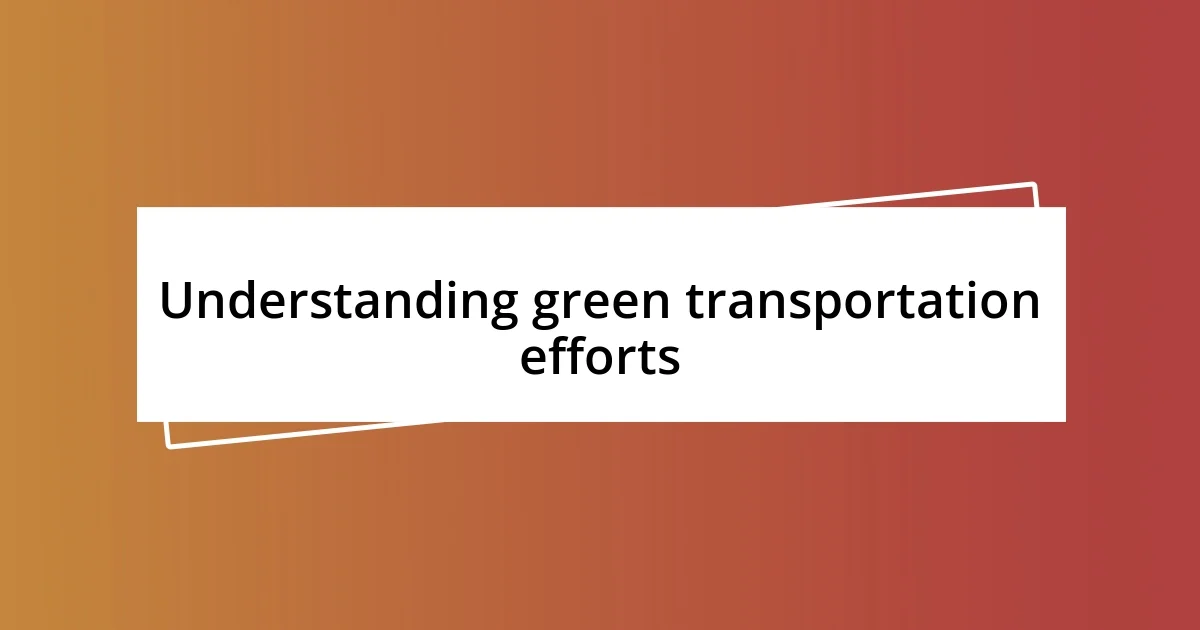
Understanding green transportation efforts
When I first started delving into green transportation, I was surprised by the variety of options available beyond just electric vehicles. From public transit systems to bike-sharing programs, there’s a whole ecosystem aimed at reducing our carbon footprint. Doesn’t it make you wonder how many daily trips could be replaced with a more sustainable choice?
One of the most compelling aspects of green transportation for me has been the community impact. I remember attending a local forum where residents passionately discussed the benefits of carpooling and investing in electric buses. It struck me then that these efforts aren’t just about individual choices—they’re about creating a larger movement that promotes environmental stewardship within our neighborhoods.
Consider how we perceive urban spaces; they have the potential to be friendlier and more accessible through green transportation initiatives. I’ve seen firsthand how cities with strong bike lanes and pedestrian-friendly pathways transform the way people interact with their environment, bringing a sense of vibrancy. Isn’t it inspiring to think that with better planning, we can redefine our commute while simultaneously caring for our planet?
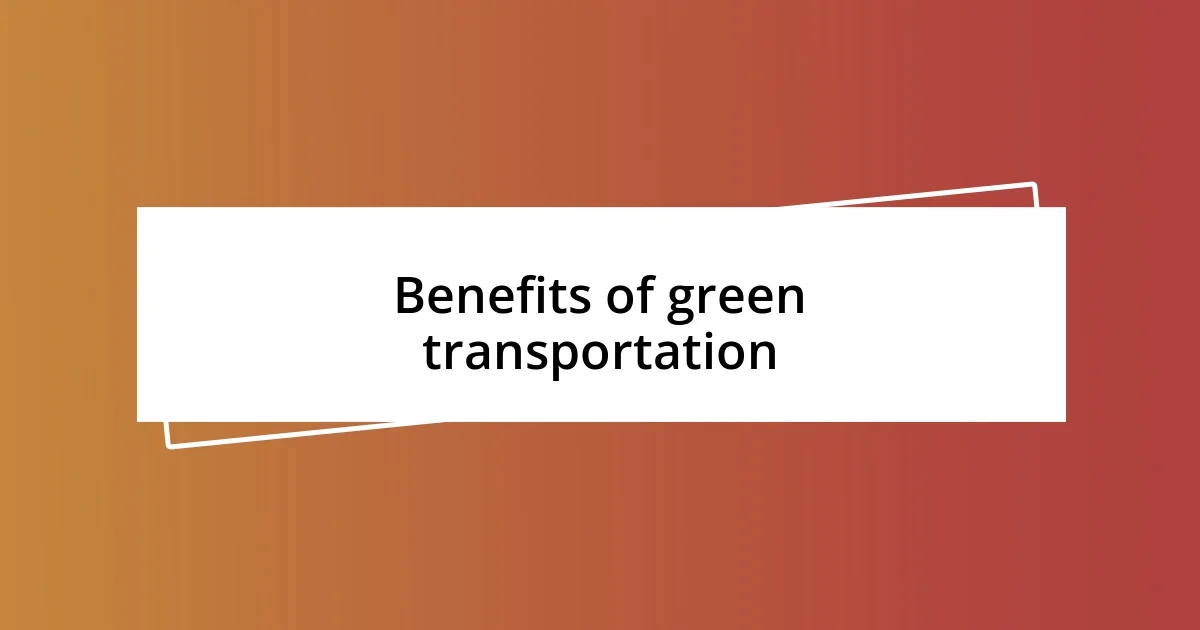
Benefits of green transportation
The environmental benefits of green transportation truly resonate with me. I vividly recall a weekend outing where I chose to ride my bike instead of driving. The fresh air felt rejuvenating, and the act of pedaling reduced my carbon emissions. Knowing that I contributed to cleaner air for my community was incredibly satisfying. It’s amazing how individual choices can collectively lead to significant improvements in air quality and a reduction in greenhouse gases.
On a larger scale, green transportation plays a pivotal role in economic savings. I remember reading about cities that invested in public transit options and saw a marked decrease in road maintenance costs. When people opt for bus or train services over driving their own vehicles, it reduces wear and tear on roads. This not only saves tax dollars but also reallocates funding into making public transit more efficient and accessible for everyone. Isn’t it powerful to realize that green choices can lead to tangible financial benefits for our communities?
Lastly, the social aspect of green transportation is something that deeply moves me. I recently participated in a community clean-up day that involved organizing a bike rally. The sense of camaraderie among participants was palpable, reminding me of how these initiatives can foster stronger community ties. By promoting options like walking, biking, or carpools, we’re not just advocating for the planet; we’re also encouraging social interaction and connection. Isn’t it uplifting to think about how green transportation can bring people together for a common cause?
| Benefit | Description |
|---|---|
| Environmental Impact | Reduces carbon emissions, leading to improved air quality. |
| Economic Savings | Cuts public spending on road maintenance and enhances transit efficiency. |
| Social Connection | Fosters community bonds through shared transportation initiatives. |
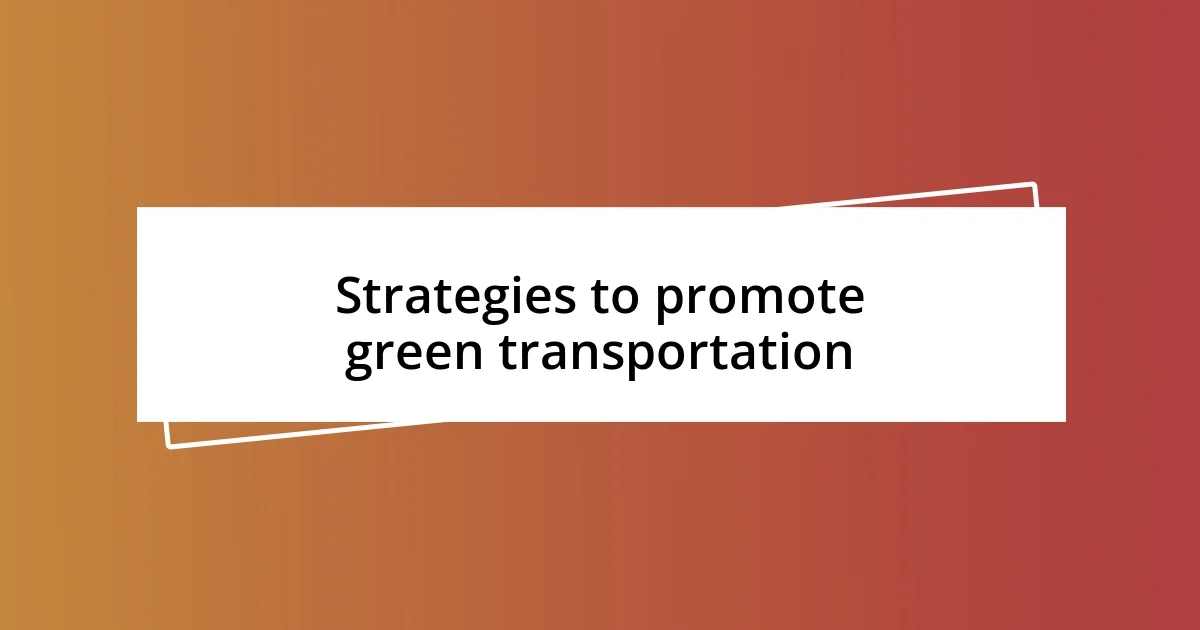
Strategies to promote green transportation
In my own experience, one strategy that has proven effective is partnering with local businesses to incentivize greener choices. For instance, I recall a local coffee shop offering discounts to customers who rode their bikes. It struck me how such a small gesture created a ripple effect, encouraging more people to consider cycling instead of driving. The sense of belonging to a community that values sustainability can really motivate individuals to make greener decisions.
Here are some strategies to promote green transportation in your community:
- Incentivize Alternative Transportation: Collaborate with local businesses to offer discounts for customers using public transit or walking.
- Education Campaigns: Host workshops that inform residents about the environmental and economic benefits of green transportation options.
- Community Challenges: Organize friendly competitions that encourage groups to bike, walk, or carpool, fostering a spirit of camaraderie.
- Enhanced Infrastructure: Advocate for safer bike lanes and pedestrian pathways to inspire more people to choose walking or cycling.
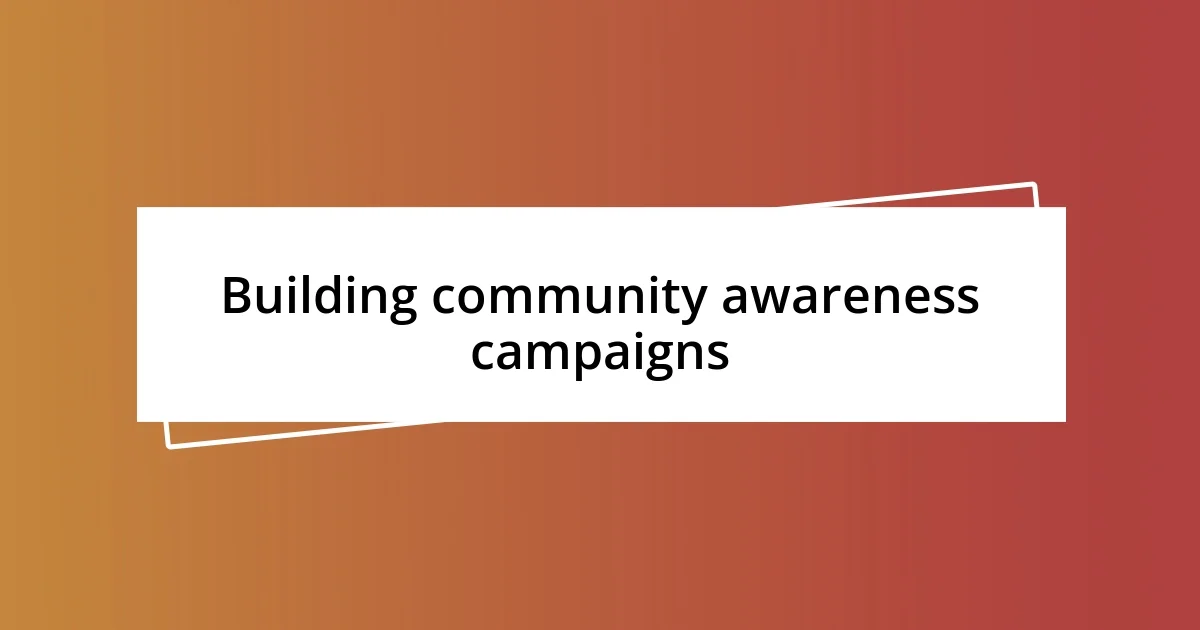
Building community awareness campaigns
Creating community awareness campaigns around green transportation is a passion of mine. I recall a time when we organized a neighborhood “Green Day” event. We set up booths to educate attendees about the benefits of cycling and public transportation. Seeing people actively engage in discussions and sharing their own experiences was incredibly rewarding. It highlighted how passionate our community can be about making a positive change.
One memorable campaign I participated in involved a series of pop-up workshops right in our local park. We set up fun activities for families, like bike safety demonstrations, and even a small bike repair station. I still remember the joy in children’s faces when they learned how to fix a flat tire. Isn’t it fascinating how making learning accessible and enjoyable can inspire the next generation to adopt greener habits? These hands-on experiences often leave a lasting impression and spark ongoing conversations about sustainable living.
I’ve also found that social media can be a powerful tool for spreading awareness. Launching a community hashtag around sustainable transportation helped create a buzz. I shared pictures of my daily bus rides and the interesting people I met. Other community members began sharing their own stories, creating a sense of solidarity. Have you ever noticed how sharing personal experiences can inspire others? It seems to have a ripple effect, motivating even more individuals to rethink their transportation choices.
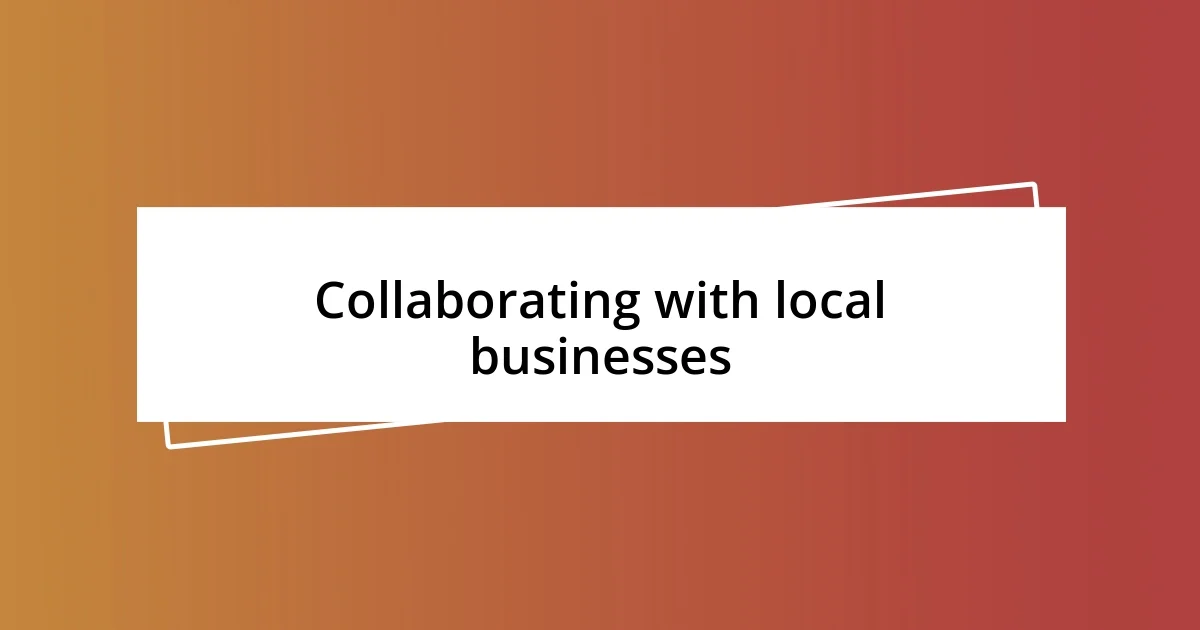
Collaborating with local businesses
Collaborating with local businesses can take many forms, and I’ve seen firsthand how creative partnerships can lead to meaningful change. For example, I worked with a nearby gym that offered free group cycling classes to members who arrived on bikes. It was inspiring to see participants not just embracing fitness but also making greener choices to reach the gym. Who knew that a simple partnership could promote health and sustainability simultaneously?
In another effort, we teamed up with a local grocery store to promote a “Car-Free Friday.” Customers who walked, biked, or took public transit to shop earned rewards points that could be redeemed for discounts. The excitement among shoppers was palpable! Hearing people share their experiences of walking to the store sparked conversations about the joys of reducing reliance on cars. Have you ever watched a community come together for a shared cause? It’s an exhilarating feeling that makes you believe in the power of collective action.
Through these collaborations, I’ve learned that when local businesses join the green transportation movement, it creates a buzz that ripples throughout the community. I once organized a small event at a local café where patrons could share their green commuting tips while enjoying coffee. The camaraderie that developed that day was electric—like a spark igniting change. I often wonder—how can we further harness that energy to inspire even more people to transition to greener options? It’s exciting to think about the potential that lies in these partnerships!

Utilizing social media for outreach
Using social media for outreach has transformed the way I engage with our community about green transportation. I remember the thrill when I hosted a live Q&A on Instagram about sustainable commuting options. It was amazing to see so many people interacting in real-time, asking questions, and sharing their concerns. Have you ever felt the electric energy of live interaction? It really brought our discussions to life and deepened our connection.
I’ve also had great success with social media challenges. For instance, I once launched a month-long “Walk, Bike, or Bus” challenge, encouraging followers to post their daily green travel journeys. The visuals of people embracing their commutes was heartwarming, with photos of families biking together and friends sharing bus rides. I can’t help but ask—how can these simple actions inspire a broader shift? It’s incredible how sharing a little fun can motivate others to adopt sustainable habits they may not have considered before.
Moreover, I’ve seen how educational content can spark interest. A short video I created showcasing the environmental impacts of each mode of transport received an unexpected surge of shares. It made me realize that visual storytelling is a powerful way to convey complex ideas. Have you ever watched a clip that changed your perspective? These engagements on social media don’t just raise awareness; they create a community of advocates eager to spread the message even further.

